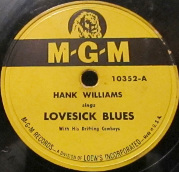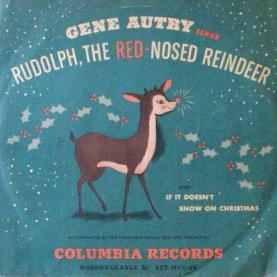Related Research Articles

Cabell Calloway III was an American jazz singer and bandleader. He was associated with the Cotton Club in Harlem, where he was a regular performer and became a popular vocalist of the swing era. His niche of mixing jazz and vaudeville won him acclaim during a career that spanned over 65 years.

"Stardust" is a jazz song composed by American singer, songwriter and musician Hoagy Carmichael with lyrics by Mitchell Parish. Now considered a standard and part of the Great American Songbook, the song has been recorded over 1,500 times either as an instrumental or vocal track, featuring different performers. During his time attending Indiana University, Carmichael developed a taste for jazz. He formed his own band and played at local events in Indiana and Ohio. Following his graduation, Carmichael moved to Florida to work for a law firm. He left the law sector and returned to Indiana, after learning of the success of one of his compositions. In 1927, after leaving a local university hangout, Carmichael started to whistle a tune that he later developed further. When composing the song, he was inspired by the end of one of his love affairs, and on the suggestion of a university classmate, he decided on its title. The same year, Carmichael recorded an instrumental version of the song for Gennett Records.

"Hound Dog" is a twelve-bar blues song written by Jerry Leiber and Mike Stoller. Recorded originally by Big Mama Thornton on August 13, 1952, in Los Angeles and released by Peacock Records in late February 1953, "Hound Dog" was Thornton's only hit record, selling over 500,000 copies, spending 14 weeks in the R&B charts, including seven weeks at number one. Thornton's recording of "Hound Dog" is listed as one of the Rock and Roll Hall of Fame's "500 Songs That Shaped Rock and Roll", ranked at 318 in the 2021 iteration of Rolling Stone's 500 Greatest Songs of All Time and was inducted into the Grammy Hall of Fame in February 2013.
"Blue Moon" is a popular song written by Richard Rodgers and Lorenz Hart in 1934 that has become a standard ballad. Early recordings included those by Connee Boswell and by Al Bowlly in 1935. The song was a hit twice in 1949, with successful recordings in the U.S. by Billy Eckstine and Mel Tormé.
"Blues in the Night" is a popular blues song which has become a pop standard and is generally considered to be part of the Great American Songbook. The music was written by Harold Arlen, the lyrics by Johnny Mercer, for a 1941 film begun with the working title Hot Nocturne, but finally released as Blues in the Night. The song is sung in the film by William Gillespie.

"Jezebel" is a 1951 popular song written by American songwriter Wayne Shanklin. It was recorded by Frankie Laine with the Norman Luboff Choir and Mitch Miller and his orchestra on April 4, 1951 and released by Columbia Records as catalog number 39367. The record reached number 2 on the Billboard chart and was a million seller. The B-side, "Rose, Rose, I Love You", was a hit too and reached number 3.

"Ramblin' Rose" is a 1962 popular torch song written by brothers Noel Sherman (words) and Joe Sherman (music) and popularized by Nat King Cole. The recording by Nat King Cole reached No. 2 on the Billboard Hot 100 chart in 1962.

"Back That Thang Up" is a song recorded by American rapper Juvenile featuring fellow American rappers Mannie Fresh and Lil Wayne. Produced by Fresh, it was released on June 11, 1999, as the second single from Juvenile's 1998 album 400 Degreez. The song was Juvenile's biggest hit single at the time until the chart-topping "Slow Motion" in 2004, surpassing "Back That Azz Up" which peaked at number 19 on the Billboard Hot 100. In 2021, it was listed at number 478 on Rolling Stone's "Top 500 Best Songs of All Time".

"Who's Sorry Now?" is a popular song with music written by Ted Snyder and lyrics by Bert Kalmar and Harry Ruby. It was published in 1923, when Isham Jones had a major hit with it. Other popular versions in 1923 were by Marion Harris, Original Memphis Five, Lewis James, and Irving Kaufman.

"Lovesick Blues" is a Tin Pan Alley song, composed by Cliff Friend, with lyrics by Irving Mills. It first appeared in the 1922 musical "Oh, Ernest", and was recorded that year by Elsie Clark and Jack Shea. Emmett Miller recorded it in 1925 and 1928, followed by country music singer Rex Griffin in 1939. The recordings by Griffin and Miller inspired Hank Williams to perform the song during his first appearances on the Louisiana Hayride radio show in 1948. Receiving an enthusiastic reception from the audience, Williams decided to record his own version despite initial push back from his producer Fred Rose and his band.

"I Will Follow Him" is a popular song that was first recorded in 1961 by Franck Pourcel, as an instrumental titled "Chariot". The song achieved its widest success when it was recorded by American singer Little Peggy March with English lyrics in 1963. The music was written by Franck Pourcel and Paul Mauriat. It was adapted by Arthur Altman. The completely new English lyrics were written by Norman Gimbel.
"Fools Rush In" (1940) is a popular song. The lyrics were written by Johnny Mercer with music by Rube Bloom.

"The Very Thought of You" is a pop standard that was recorded and published in 1934 with music and lyrics by Ray Noble. The song was first recorded by Ray Noble and His Orchestra with Al Bowlly on vocals for HMV in England in April 1934. This record was then released in the United States by Victor, and it reached number one for five weeks on the pop music charts.
"Chanson D'Amour" is a popular song written by Wayne Shanklin. A 1977 recording by The Manhattan Transfer was an international hit, reaching #1 in the UK Singles Chart, and Australia.
"That Lucky Old Sun (Just Rolls around Heaven All Day)" is a 1949 popular song with music by Beasley Smith and words by Haven Gillespie.
"(Now and Then There's) A Fool Such as I" is a popular song written by Bill Trader and published in 1952. Recorded as a single by Hank Snow it peaked at number four on the US country charts early in 1953.
"Moon Over Naples" is a 1965 instrumental composed and recorded by German bandleader Bert Kaempfert. The instrumental version reached No. 6 on Billboard's Adult Contemporary chart. It won a BMI Award in 1968.

"Rudolph, the Red-Nosed Reindeer" is a song by songwriter Johnny Marks based on the 1939 story Rudolph the Red-Nosed Reindeer published by the Montgomery Ward Company. Gene Autry's recording hit No. 1 on the U.S. charts the week of Christmas 1949.

"History Repeats Itself" is a 1966 narrated song written and recorded by Buddy Starcher. It became his greatest hit, reaching number 39 on the U.S. Billboard Hot 100 and number two on the Country singles chart.
"It's Just a Little Bit Too Late" is a song written by Clint Ballard Jr. and Les Ledo, which was originally recorded by Clyde McPhatter in 1963. A British beat group named the Druids would release their version in 1964 before the definitive version by Wayne Fontana and the Mindbenders was recorded and released as a single in 1965. Their version was the second of three songs by Clint Ballard Jr. that the group recorded together with "The Game of Love" and "She Needs Love". Their rendition of the song reached number 20 in the UK's Record Retailer but failed to emulate the success of their previous single "The Game of Love", only reaching number 45 on the Billboard Hot 100.
References
- ↑ Catalog of Copyright Entries: Third series. Copyright Office, Library of Congress. 1953. p. 470.
- ↑ "The Little Boy And The Old Man". YouTube . Retrieved 1 May 2021.
- ↑ "L'homme et l'enfant de Wayne Shanklin (1953)". 11 July 2018. Archived from the original on 2018-07-11. Retrieved 1 May 2021.
- ↑ Catalog of Copyright Entries: Third series. Copyright Office, Library of Congress. 1957. p. 243.
- ↑ "Popular Records: The Top 100". Billboard. February 18, 1956. p. 51.
- ↑ "All US Top 40 Singles for 1956". 28 July 2018. Archived from the original on 2018-07-28. Retrieved 1 May 2021.
- ↑ "Reviews of New Pop Records". Billboard. February 4, 1956. p. 44.
- ↑ "Little Child (song by Cab Calloway)". Music VF, US & UK hits charts.